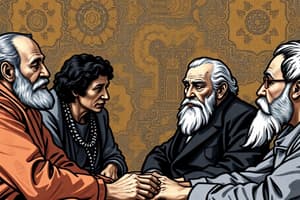Podcast
Questions and Answers
What role does the concept of conflicted conscience play in therapy?
What role does the concept of conflicted conscience play in therapy?
It helps in resolving unconscious feelings that affect a patient's recovery.
How do sociologists view the impact of social structures on individuals?
How do sociologists view the impact of social structures on individuals?
Sociologists analyze how institutions like schools and media shape personal experiences and societal roles.
In what way does cognitive therapy consider mental states?
In what way does cognitive therapy consider mental states?
Cognitive therapy takes into account beliefs, motivations, and desires to understand and treat mental disorders.
What does paleoanthropology study and why is it significant?
What does paleoanthropology study and why is it significant?
What is the function of melanin in human skin?
What is the function of melanin in human skin?
Explain the relationship between 'functional unity' and 'cultural materialism' as presented in the provided text. How might material needs influence the integration of different parts of a culture?
Explain the relationship between 'functional unity' and 'cultural materialism' as presented in the provided text. How might material needs influence the integration of different parts of a culture?
How might the concepts of 'universal functions' and 'postmodernism' create a challenge for anthropologists studying other cultures? Using an example, explain the potential conflict between objectivity and subjectivity in anthropological research.
How might the concepts of 'universal functions' and 'postmodernism' create a challenge for anthropologists studying other cultures? Using an example, explain the potential conflict between objectivity and subjectivity in anthropological research.
Explain how 'classical conditioning' and 'operant conditioning' relate to the concept of 'behaviorism'. How do these principles contribute to understanding and changing human behavior?
Explain how 'classical conditioning' and 'operant conditioning' relate to the concept of 'behaviorism'. How do these principles contribute to understanding and changing human behavior?
What critique does feminist theory offer towards traditional anthropological perspectives? How does it challenge the notion of cultural universality?
What critique does feminist theory offer towards traditional anthropological perspectives? How does it challenge the notion of cultural universality?
Compare and contrast the approaches of 'cultural materialism' and 'feminist theory' in understanding cultural phenomena. How might these perspectives lead to different interpretations of the same cultural practice?
Compare and contrast the approaches of 'cultural materialism' and 'feminist theory' in understanding cultural phenomena. How might these perspectives lead to different interpretations of the same cultural practice?
What is the primary focus of psychoanalysis in understanding human behavior?
What is the primary focus of psychoanalysis in understanding human behavior?
How does the Ego function in contrast to the Id within Freud's model of the mind?
How does the Ego function in contrast to the Id within Freud's model of the mind?
What defense mechanism involves justifying unacceptable feelings with logical reasons?
What defense mechanism involves justifying unacceptable feelings with logical reasons?
In humanistic psychology, what role does the patient play in their recovery process?
In humanistic psychology, what role does the patient play in their recovery process?
What is the purpose of defense mechanisms like repression and displacement?
What is the purpose of defense mechanisms like repression and displacement?
How did Aaron Stern's approach in the Edith Experiment aim to demonstrate the role of environment in intelligence development?
How did Aaron Stern's approach in the Edith Experiment aim to demonstrate the role of environment in intelligence development?
What does Oxana Malaya's experience illustrate about the effects of abnormal socialization on human behavior?
What does Oxana Malaya's experience illustrate about the effects of abnormal socialization on human behavior?
What ethical concerns were raised by the Stanford prison experiment, and how did the roles assigned to participants affect their behavior?
What ethical concerns were raised by the Stanford prison experiment, and how did the roles assigned to participants affect their behavior?
According to the theory of evolution, what role does natural selection play in the adaptation and survival of species?
According to the theory of evolution, what role does natural selection play in the adaptation and survival of species?
In the context of the Theory of Evolution, how does the concept of variations among individuals contribute to the process of evolution?
In the context of the Theory of Evolution, how does the concept of variations among individuals contribute to the process of evolution?
According to Karl Marx, what is the primary driver of social change?
According to Karl Marx, what is the primary driver of social change?
According to Dorothy Smith, what is the main issue for women in their relationship to their experiences?
According to Dorothy Smith, what is the main issue for women in their relationship to their experiences?
Max Weber's concept of rationalization focuses on what primary motivator of social actions?
Max Weber's concept of rationalization focuses on what primary motivator of social actions?
Which branch of anthropology focuses on humans as a biological species?
Which branch of anthropology focuses on humans as a biological species?
Which branch of psychology uses experimentation to understand and change human behaviour?
Which branch of psychology uses experimentation to understand and change human behaviour?
How did Durkheim's study of suicide challenge purely individualistic explanations of behavior?
How did Durkheim's study of suicide challenge purely individualistic explanations of behavior?
According to Parsons, what seemingly contradictory human motivations guide social behavior?
According to Parsons, what seemingly contradictory human motivations guide social behavior?
How does logotherapy, founded by Karl Rogers, differ from traditional psychotherapy?
How does logotherapy, founded by Karl Rogers, differ from traditional psychotherapy?
Why might Parsons' ideas on social evolution be considered controversial?
Why might Parsons' ideas on social evolution be considered controversial?
In what way did Durkheim use the concept of 'social facts' to study society?
In what way did Durkheim use the concept of 'social facts' to study society?
Flashcards
Sociology
Sociology
The scientific study of how people interact within groups and societies. It examines the relationships between individuals and the social structures they form. Sociologists explore how institutions like schools, prisons, healthcare, and the media shape our lives and experiences.
Bipedalism
Bipedalism
A major type of locomotion where an organism moves primarily on its two hind legs. This is a defining characteristic of humans, setting us apart from other primates.
Melanin
Melanin
A pigment found in our skin that provides natural protection against harmful UV rays from the sun.
Paleoanthropology
Paleoanthropology
Signup and view all the flashcards
Homo sapiens
Homo sapiens
Signup and view all the flashcards
Universal Functions
Universal Functions
Signup and view all the flashcards
Functional Unity
Functional Unity
Signup and view all the flashcards
Cultural Materialism
Cultural Materialism
Signup and view all the flashcards
Feminist Theory
Feminist Theory
Signup and view all the flashcards
Postmodernism
Postmodernism
Signup and view all the flashcards
Unconscious Mind
Unconscious Mind
Signup and view all the flashcards
Ego
Ego
Signup and view all the flashcards
Projection
Projection
Signup and view all the flashcards
Id
Id
Signup and view all the flashcards
Rationalization
Rationalization
Signup and view all the flashcards
Feral Child
Feral Child
Signup and view all the flashcards
Isolate Child
Isolate Child
Signup and view all the flashcards
Stanford Prison Experiment
Stanford Prison Experiment
Signup and view all the flashcards
Natural Selection
Natural Selection
Signup and view all the flashcards
Physical Anthropology
Physical Anthropology
Signup and view all the flashcards
Anthropology
Anthropology
Signup and view all the flashcards
Cultural Anthropology
Cultural Anthropology
Signup and view all the flashcards
Conflict Theory (Marx)
Conflict Theory (Marx)
Signup and view all the flashcards
Symbolic Interactionism (Weber)
Symbolic Interactionism (Weber)
Signup and view all the flashcards
Logotherapy
Logotherapy
Signup and view all the flashcards
Cognitive Psychology
Cognitive Psychology
Signup and view all the flashcards
Structural Functionalism
Structural Functionalism
Signup and view all the flashcards
Talcott Parsons
Talcott Parsons
Signup and view all the flashcards
Emile Durkheim
Emile Durkheim
Signup and view all the flashcards
Study Notes
Main Theorists and Discoveries
-
Anthropology Theorists:
- Margaret Mead (cultural)
- Dian Fossey (Primatology)
- Jane Goodall (Primatology)
- Donald Johanson (Paleoanthropology)
- Charles Darwin (Paleoanthropology)
- Raymond Dart (Paleoanthropology)
-
Psychology Theorists:
- Ivan Pavlov (Classical Conditioning, Behaviourism): Investigated salivation in dogs, noticing that dogs salivated upon entering the room regardless of whether food was present.
- B.F. Skinner (Operant Conditioning, Behaviourism): Concerned with observable behaviors, using rats and pigeons to demonstrate how rewards and punishment influenced behavior.
- Sigmund Freud (Psychoanalysis): Believed unconscious feelings influenced behavior; errors like "Freudian slips" reveal subconscious feelings about new relationships. Early childhood experiences influence the unconscious mind throughout life.
- Karen Horney (Psychoanalysis): Modifies Freud's theory to incorporate social and cultural aspects. Argues personality is not solely determined by childhood sexual conflicts.
- Women are impacted by society's influence; conflicts develop from feeling unsafe, unloved, or undervalued.
- Carl Jung (Psychoanalysis): A branch of psychology which emphasizes balancing the psyche to allow for full potential.
Jung on the Mind
- Analytical Psychology: A branch of psychology that emphasizes balancing the psyche for full potential.
- Psyche: Includes both personal and collective unconscious.
- Personal Unconscious: Unique to each individual.
- Collective Unconscious: Shared memories across all humans.
- Archetypes: Universal symbols (e.g., Mother, Hero, Trickster) found across cultures.
The "Psyche" - Mind
- This includes both personal and collective unconscious elements.
###Archetypal Examples
- Mother: Soothing, nurturing
- Father: Stern, powerful, controlling
- Hero: Courageous champion
- Trickster: Deceptive
Abraham Maslow
- He emphasizes that the most basic needs must be met before social needs can be met.
- He believed that basic psychological needs like food, water, and shelter are important before anything else.
- He believes people have a desire to fulfill individual potential.
Karl Rogers (Humanism)
- Believed an environment of genuineness, empathy, and acceptance is necessary for personal growth.
Emile Durkheim (Structural Functionalism)
- Formally established sociology as a discipline.
- Studied social facts. Concluded that suicide (male suicide being more common) is influenced by social forces.
- Believed humans are social creatures.
Talcott Parsons
- Studied social facts, concluding that humans cooperate despite self-interest.
- Believes social evolution and social Darwinism impact society.
Karl Marx (Conflict Theory)
- Theorized about conflict between social classes (e.g., workers and owners).
- Believes wealthy use power to prevent the poor from acquiring equality.
Dorothy Smith (Feminist Sociology)
- Women's experiences are alienated in traditional sociological theories.
Max Weber (Symbolic Interactionism)
- Focuses on individuals within society.
- Emphasizes role of individuals in influencing society
- Believes social life depends on individual's ability to see and act on roles in society.
Additional Topics
- Introduction to Social Sciences: Anthropology
- Anthropology: Includes Cultural Anthropology, Physical Anthropology, Linguistics, and Archaeology.
- Physical Anthropology
- Cultural Anthropology, Ethnography, Archaeology, Kinship, and Rites of Passage
- Psychology
- Behaviourism: Describes both Classical and Operant conditioning as forms of learning. Shows how behaviours are altered using rewards and punishments.
- Cognitive Psychology: Describes the brain's process, learning, mental states
- Psychoanalysis: Discusses instinctual drives, rational minds, ego, id, and defense mechanisms (examples of denial, regression).
- Sociology: Social interactions, institutions, gender roles, prejudice, and theories like structural functionalism.
- Additional Sociological Theories/Issues : discrimination, prejudice, competition theory, aggression theory, socialization, social class and poverty, structure functionalism, conflict theory.
Studying That Suits You
Use AI to generate personalized quizzes and flashcards to suit your learning preferences.




